Related Research Articles
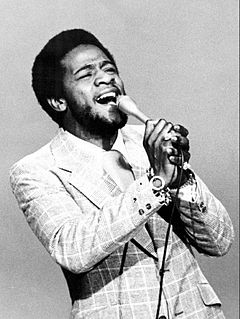
Soul music is a popular music genre that originated in the African American community throughout the United States in the 1950s and early 1960s. It combines elements of African-American gospel music, rhythm and blues and jazz. Soul music became popular for dancing and listening in the United States, where record labels such as Motown, Atlantic and Stax were influential during the Civil Rights Movement. Soul also became popular around the world, directly influencing rock music and the music of Africa.

Aretha Louise Franklin was an American singer, songwriter, and pianist. Referred to as the "Queen of Soul", she has twice been placed 9th in Rolling Stone's 100 Greatest Artists of All Time. Franklin began her career as a child, singing gospel at New Bethel Baptist Church in Detroit, Michigan, where her father C. L. Franklin was a minister.

Linda Hopkins was a Tony-winning American actress and blues and gospel singer. She recorded classic, traditional, and urban blues, and performed R&B and soul, jazz, and show tunes.
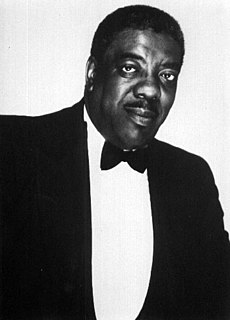
James Edward Cleveland was an American gospel singer, musician, and composer. Known as the King of Gospel, Cleveland was a driving force behind the creation of the modern gospel sound by incorporating traditional black gospel, soul, pop, and jazz in arrangements for mass choirs. Throughout his career, Cleveland appeared on hundreds of recordings and earned four Grammy Awards. He was the first gospel musician to earn a star on the Hollywood Walk of Fame. He was inducted into the Gospel Music Hall of Fame in 1984. For his trailblazing accomplishments, he is regarded by many as one of the greatest gospel singers who ever lived. He is best known for his gospel classics "Lord, Help Me to Hold Out," "Peace Be Still," "I Don't Feel No Ways Tired", “Where Is Your Faith," "The Love of God," "God Has Smiled on Me", and his soul-stirring rendition of Gladys Knight & The Pips' "You're the Best Thing That Ever Happened to Me."
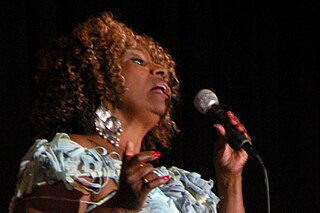
Brenda Holloway is an American singer and songwriter, who was a recording artist for Motown Records during the 1960s. Her best-known recordings are the soul hits, "Every Little Bit Hurts", "When I'm Gone", and "You've Made Me So Very Happy." The latter, which she co-wrote, was later widely popularized when it became a Top Ten hit for Blood, Sweat & Tears. She left Motown after four years, at the age of 22, and largely retired from the music industry until the 1990s, after her recordings had become popular on the British "Northern soul" scene.
Caroline Crawford is an American rhythm and blues, pop, soul, and disco singer; and actress, who recorded as Carolyn Crawford for Motown Records in the early-mid 1960s, and for other labels later in her career.
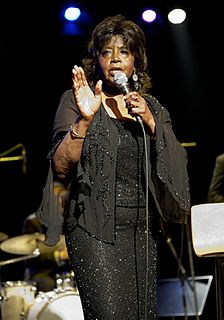
Justine Washington, usually credited as Baby Washington, but credited on some early records as Jeanette (Baby) Washington, was an American soul music vocalist, who had 16 US Billboard R&B chart entries in 15 years, most of them during the 1960s. Her biggest hit, "That's How Heartaches Are Made" in 1963, also entered the Top 40 on the US Billboard Hot 100.
Garnet Mimms is an American singer, influential in soul music and rhythm and blues. He first achieved success as the lead singer of Garnet Mimms & The Enchanters, and is best known for the 1963 hit "Cry Baby", later recorded by Janis Joplin. According to Steve Huey at AllMusic, his "pleading, gospel-derived intensity made him one of the earliest true soul singers [and] his legacy remains criminally underappreciated."
Bessie Banks is an American soul singer, best known for her original 1964 recording of "Go Now," successfully covered in the same year by UK band the Moody Blues.
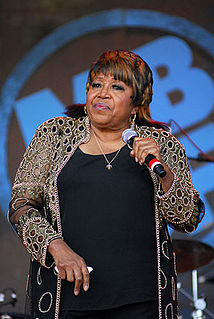
Ora Denise Allen, known by the stage name Denise LaSalle, was an American blues, R&B and soul singer, songwriter, and record producer who, since the death of Koko Taylor, had been recognized as the "Queen of the Blues".

Apollo Records was a record company and label founded in New York City by Hy Siegel and Ted Gottlieb in 1944. A years later it was sold to Ike and Bess Berman. Apollo was known for blues, doo-wop, gospel, jazz, and rock and roll.
Laura Lee is an American soul and gospel singer and songwriter, most successful in the 1960s and 1970s and influential for her records which discussed and celebrated women's experience.
Hattie Littles was an American soul singer, best known for her 1963 single, "Your Love Is Wonderful," released on Motown's Gordy label.
Lawrence H. Banks was an American R&B and soul singer, songwriter, and record producer.

Detroit, Michigan, is a major center in the United States for the creation and performance of music, and is best known for three developments: Motown, early punk rock, and techno.
Paul Stuart Davies is a British soul singer, songwriter and vocal coach, best known for his work on the Northern soul and Motown scene.
Lula Reed was an American rhythm and blues and gospel singer who recorded in the 1950s and 1960s. She had two R&B hits in 1952 as vocalist with pianist and bandleader Sonny Thompson, and later recorded with guitarist Freddy King. She was occasionally credited as Lulu Reed.
Terry Dexter is an American contemporary R&B singer-songwriter, multi-instrumentalist, and actress.

Casino Classics: Chapter One is a compilation album released by Casino Classics in 1979, which compiles the first seven northern soul singles that the label had released or re-released as 45 rpm releases in 1978–79 following their popularity at northern soul nightclub Wigan Casino. The singles, some of which were rare, were originally released on the label in order to cater for the nightclub's record-collecting goers at the height of the nightclub's popularity. The compilation is the first in the Casino Classics series and was released to general acclaim. It has been described as a best-selling album. In 2015, Cherry Red Records re-released the album as part of the Casino Classics: Complete Collection box set.
David Lewis Hamilton was an American R&B and jazz musician and record producer in Detroit, Michigan.
References
- 1 2 3 4 Toronto Blues Society: Tobi Lark
- 1 2 Tobi Lark discography at SoulfulKindaMusic.net
- ↑ Soulful Detroit: The Golden World Story
- 1 2 Barton, Laura (October 21, 2010). "Hail, Hail, Rock'n'Roll". The Guardian . London. Retrieved May 6, 2021.
- ↑ Tobi Legend at Discogs.com
- ↑ "Tobi Lark and "Toronto"" . Retrieved September 11, 2016.[ dead link ]
- ↑ "Item Display – RPM – Library and Archives Canada". Archived from the original on September 3, 2014. Retrieved July 19, 2012.